
Morgan Freeman is an American actor, producer, and narrator. In a career spanning five decades, he has received numerous accolades, including an Academy Award and a Golden Globe Award, as well as a nomination for a Tony Award. He was honored with the Kennedy Center Honor in 2008, an AFI Life Achievement Award in 2011, the Cecil B. DeMille Award in 2012, and Screen Actors Guild Life Achievement Award in 2018. He is widely regarded as one of the greatest actors of all time.

A Soldier's Story is a 1984 American mystery drama film directed and produced by Norman Jewison, adapted by Charles Fuller from his Pulitzer Prize-winning A Soldier's Play. It is a murder mystery set in a segregated regiment of the U.S Army commanded by White officers and training in the Jim Crow South. In a time and place where a Black commissioned officer is bitterly resented by nearly everyone, an African-American JAG captain investigates the murder of an African-American drill sergeant in Louisiana following American entry into World War II. As the investigation proceeds, the events leading up to the sergeant's murder are shown in flashbacks.
The Black People's Convention (BPC) was a national coordinating body for the Black Consciousness movement of South Africa. Envisaged as a broad-based counterpart to the South African Students' Organisation, the BPC was active in organising resistance to apartheid from its establishment in 1972 until it was banned in late 1977.

A Dry White Season is a 1989 American drama film directed by Euzhan Palcy, and starring Donald Sutherland, Jürgen Prochnow, Marlon Brando, Janet Suzman, Zakes Mokae and Susan Sarandon. It was written by Colin Welland and Palcy, based upon André Brink's novel A Dry White Season. Robert Bolt also contributed uncredited revisions of the screenplay. It is set in South Africa in 1976 and deals with the subject of apartheid. Brando was nominated for the Academy Award for Best Supporting Actor.

Red Scorpion is a 1988 American action film starring Dolph Lundgren and directed by Joseph Zito. Lundgren appears as a Soviet special forces ("Spetsnaz") operative sent to assassinate an anti-communist rebel leader in Africa, only to side with the rebels. It was produced by lobbyist Jack Abramoff and controversially filmed in South West Africa with the support of the apartheid-era South African government. The film was released in the United States on April 21, 1989. It is the first installment in the Red Scorpion film series.

Blacula is a 1972 American blaxploitation horror film directed by William Crain. It stars William Marshall in the title role about an 18th-century African prince named Mamuwalde, who is turned into a vampire by Count Dracula in the Count's castle in Transylvania in the year 1780 after Dracula refuses to help Mamuwalde suppress the slave trade.
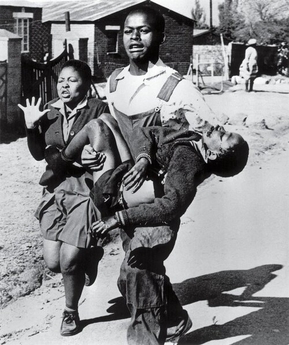
The Soweto uprising, also known as the Soweto riots, was a series of demonstrations and protests led by black school children in South Africa during apartheid that began on the morning of 16 June 1976.

In My Country is a 2004 drama film directed by John Boorman, and starring Samuel L. Jackson and Juliette Binoche. It is centred around the story of Afrikaner poet Anna Malan (Binoche) and an American journalist, Langston Whitfield (Jackson), sent to South Africa to report about the South African Truth and Reconciliation Commission hearings.

Stander is a 2003 South African biographical film directed by Bronwen Hughes, about Captain André Stander, a South African police officer turned bank robber, starring Thomas Jane, who initially turned down the role. The filmmakers were able to talk to Allan Heyl, one of Stander's accomplices who was still imprisoned; Cor van Deventer, his police partner; and the warden of the prison where André was incarcerated.

Catch a Fire is a 2006 biographical thriller film about activists against apartheid in South Africa. The film was directed by Phillip Noyce, from a screenplay written by Shawn Slovo. Slovo's father, Joe Slovo, and mother Ruth First, leaders of the South African Communist Party and activists in the Anti-Apartheid Movement, appear as characters in the film, while her sister, Robyn Slovo, is one of the film's producers and also plays their mother Ruth First. Catch a Fire was filmed on location in South Africa, Swaziland and Mozambique.

Red Dust is a 2004 British drama film starring Hilary Swank and Chiwetel Ejiofor and directed by Tom Hooper.

There is a wide range of ways in which people have represented apartheid in popular culture. During (1948–1994) and following the apartheid era in South Africa, apartheid has been referenced in many books, films, and other forms of art and literature.

Internal resistance to apartheid in South Africa originated from several independent sectors of South African society and took forms ranging from social movements and passive resistance to guerrilla warfare. Mass action against the ruling National Party (NP) government, coupled with South Africa's growing international isolation and economic sanctions, were instrumental in leading to negotiations to end apartheid, which began formally in 1990 and ended with South Africa's first multiracial elections under a universal franchise in 1994.
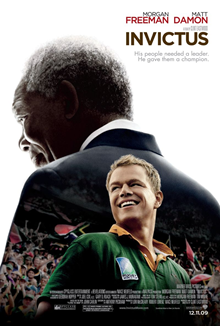
Invictus is a 2009 biographical sports film directed by Clint Eastwood and starring Morgan Freeman and Matt Damon, making it the third collaboration between Eastwood and Freeman after Unforgiven (1992) and Million Dollar Baby (2004). The story is based on the 2008 John Carlin book Playing the Enemy: Nelson Mandela and the Game That Made a Nation about the events in South Africa before and during the 1995 Rugby World Cup. The Springboks were not expected to perform well, the team having only recently returned to high-level international competition following the dismantling of apartheid—the country was hosting the World Cup, thus earning an automatic entry. Freeman portrays South African President Nelson Mandela while Damon played Francois Pienaar, the captain of the Springboks, the South Africa rugby union team.
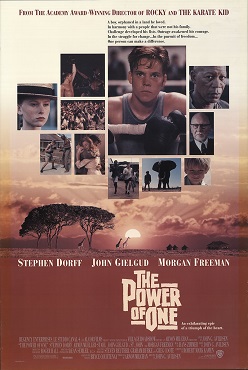
The Power of One is a 1992 drama film directed and edited by John G. Avildsen, loosely based on Bryce Courtenay's 1989 novel of the same title. The film stars Stephen Dorff, John Gielgud, Morgan Freeman, Armin Mueller-Stahl, and Daniel Craig in his feature film debut.
Mapantsula is a 1988 South African crime film directed by Oliver Schmitz and written by Schmitz and Thomas Mogotlane. It tells the story of Johannes 'Panic' Themba Mzolo (Mogotlane), a small-time thief, set against the backdrop of Apartheid. The film's use of flashbacks between Panic's time at the hands of his apartheid jailor 'Stander' and happenings in the Johannesburg township of Soweto display the injustices black South Africans suffered during apartheid and their struggle for suffrage. The film makes extensive use of political rallies, police brutality, and racial difference to example the effects of apartheid on black South Africans. It was screened in the Un Certain Regard section at the 1988 Cannes Film Festival. The film was selected as the South African entry for the Best Foreign Language Film at the 62nd Academy Awards, but was not accepted as a nominee.

Sarafina! is a 1992 musical drama film based on Mbongeni Ngema's 1987 musical of the same name. The film was directed by Darrell Roodt and written by Ngema Mbongeni and William Nicholson, and stars Leleti Khumalo, Miriam Makeba, John Kani, Ngema, and Whoopi Goldberg; Khumalo reprises her role from the stage performance.
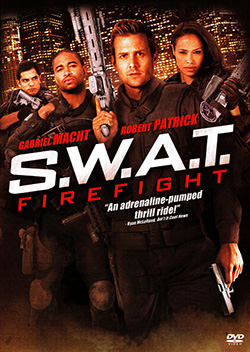
S.W.A.T.: Firefight is a 2011 American direct-to-DVD action crime film directed by Benny Boom. It is a sequel to the 2003 film S.W.A.T., based on the 1975 S.W.A.T. television series. Despite its name, the film does not feature any of the original cast nor are there any mentions of the previous TV series.

Black Butterflies is an English-language Dutch drama film about the life of South-African Afrikaans poet and anti-apartheid political dissident Ingrid Jonker. The film was directed by Paula van der Oest and premiered in the Netherlands on February 6 before being released on 31 March 2011.
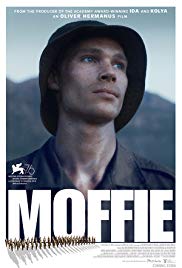
Moffie is a 2019 biographical war romantic drama film co-written and directed by Oliver Hermanus. Based on the autobiographical novel of the same name by André Carl van der Merwe, the film depicts mandatory conscription into the notorious South African Defence Force (SADF) during apartheid through the eyes of a young closeted character Nicholas van der Swart as he attempts to hide his attraction to another gay recruit in a hostile environment. The title derives from a homophobic slur in South Africa used to police masculinity.


















